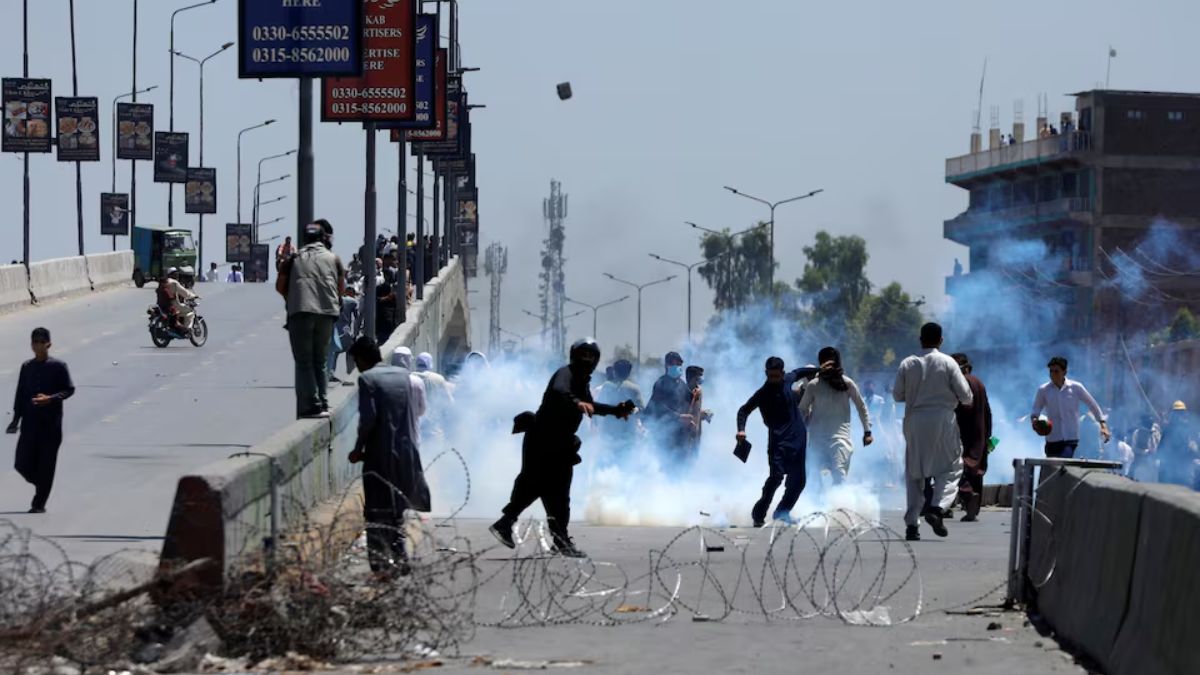Widespread anger simmers, violence erupts in Pakistan-administered Kashmir

The situation in Pakistan-administered Kashmir has continued to worsen after the recent protests saw heavy participation by the masses. A series of protests has embroiled Pakistan-administered Kashmir as local people are suffering from high food inflation, exorbitant energy bills, higher taxes, dominance and exploitation by the Islamabad government, lack of development and inadequate representation in the governance.
Islamabad has been drawing criticism from the people of Gilgit-Baltistan and ‘Azad Kashmir’, which are part of the Pakistan-administered Kashmir region. These regions have seen frequent protests in the past few years, which largely remained peaceful. Recently, one such protest turned violent as Islamabad failed to fulfil the long-pending demands of the locals. Stones were pelted and public property was damaged in the violent agitations in Muzaffarabad.
Protests continued to occur even at midnight, local people gave fiery speeches, and physically- challenged participated to condemn the Pakistan government’s policies and governance. “Even at midnight, the fight for rights and justice against the Pakistani regime intensifies,” said a Kashmiri named Yusra Iqbal.[4] Another Kashmir named Jannat Benazeer said “In Azad Kashmir, voices unite in protest against security force actions. The quest for justice and freedom resonates through the streets.”
Toqeer Gilani, president of Jammu Kashmir Liberation Front (JKLF), said the protests were part of a movement for the restoration of basic rights and an end to the exploitation of resources by Islamabad. “Unbearable and illegal taxation, with growing prices of food, electricity, end of subsidies on flour and the misuse of public funds by the political and bureaucratic elite have triggered this large-scale movement for rights,” he said.
The mass protests and simmering anger show how strict control the Islamabad government exercises over these regions, said Salman Rafi Shaeikh, a politics professor at Lahore University of Management Sciences. “Protests in May shattered the myth of Pakistan-administered Kashmir, or Azad Kashmir, being truly free. Kashmiris in Pakistan feel relegated to secondary status and say that Islamabad often violates their nominal autonomy,” he said.
Shaukat Nawaz Mir, chairman of the Jammu Kashmir Joint Awami Action Committee (JAAC), called the government “incompetent” which he said had “miserably failed to serve the people.” Three people were killed after Pakistani forces shot bullets at the protestors, who were expressing their anger over unbearable prices of food commodities and electricity. Since then, the protests have turned into a widespread public movement. A local trader Akhter Ali called it an “unprecedented” uprising. “The soaring inflation was unbearable, so this huge people’s protest was required,” he said.
A group of councillors from Pakistan-administered Kashmir held a protest in the city of Muzaffarabad against the lack of development and delays in the release of civic funds for the welfare of Kashmiri people. “It’s been more than 1.5 years since local body elections were conducted. It was said that those who get elected in the local body election will get the funds. But you all know the current situation,” said one protestor.
Amid the constant agitations, internet services were suspended while schools and colleges remained closed even as Islamabad deployed more security personnel. “Protests over specific economic grievances reflect a broader frustration with disempowerment and frequent interference from Islamabad,” said Ankara-based journalist Iftikar Gilani.
The protests in Kashmir were peaceful until Pakistan forces opened fire at them. People blamed the Islamabad government and the Pakistani spy agency ISI chief Nadeem Anjum for the protests turning violent. “If the government in Islamabad has no clue who ordered the Rangers to open fire on peaceful protestors in Azad Kashmir then there is only one explanation. Nadeem Anjum is in direct control of agent provocateurs instigating fear and violence against peaceful protests,” said public commenter Zeeshan Khan.
Brussels-based Kashmir Council Europe has demanded an impartial probe into the deaths of peaceful protestors. Kashmiris took a dig at Pakistani media for ignoring the widespread protest in Gilgit-Baltistan and Kashmir regions. “The Pakistani DAJALI (lapped) media is completely silent; the situation in Azad Kashmir is deteriorating gradually, but there’s still a chance for the Pakistani media to show everything. Curse be upon you and your handlers,” said a lawyer named Gillani Syed on X.
Those journalists who tried to cover the protests were threatened by the Pakistani agencies. One such journalist named Ahmed Farhad was abducted and later charged under stringent terrorism-related laws. Amnesty International has demanded Farhad be released and those behind his enforced disappearance be penalised.
END.






